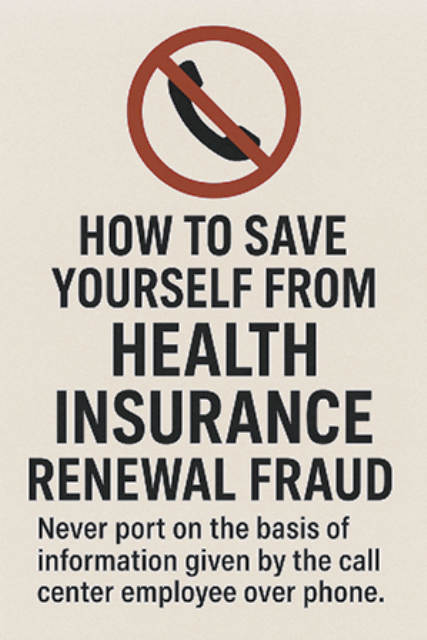How to Save Yourself from Health Insurance Renewal online Fraud
Health insurance is one of the most important financial protections you can have—but it’s also a common target for fraud, especially during the renewal period. Many policyholders receive calls from people claiming to represent insurance companies, offering better deals or suggesting you “port” (transfer) your current policy to another provider. While some of these calls may be legitimate, many are not. Falling for a fraudulent TrueCaller can result in losing your valuable health coverage or benefits.
There are many who had lost their seniority in Health Insurance on the words of a telecaller without knowing the losses due to the porting their policy to a new Health Insurance company.

Here’s how you can protect yourself and avoid becoming a victim of health insurance renewal fraud.
1. Don’t Trust TrueCaller Blindly
During renewal season, you might get calls from people claiming to be representatives from other insurance providers or a third-party agency. They may use aggressive sales tactics, urgent language, or promises like “better coverage,” “zero waiting period,” or “lower premium.” These calls can sound convincing, but never make decisions based on verbal information alone.
Fraudsters often have just enough details to seem legitimate—like your name, policy number, or insurer’s name—but they may mislead you into porting your existing policy to another plan that doesn’t actually serve your needs or may not even exist.
2. Never Port Your Policy Over a Call
Porting a health insurance policy is a major decision. Your current policy likely covers important benefits, including pre-existing diseases, waiting periods already served, specific hospitalization clauses, and more.
Once you port, these benefits might reset. For instance, if you have already completed a 3-year waiting period for a pre-existing condition, a new insurer might ask you to complete the waiting period again. This could leave you uncovered when you need it most.
Unless you fully understand the pros and cons—and have verified everything in writing—never agree to port your health insurance based on a phone conversation alone.
3. Your Existing Policy Might Already Cover What You Need
Many people port their policies because they think the new plan offers something better, only to later discover that their original policy already had those benefits.
It’s important to regularly review your health insurance policy and understand exactly what is covered. If you have doubts, contact your insurer directly via their official customer service number or email—never through a number provided by an unknown caller.
4. Always Ask for Written Details
If a caller is offering a policy upgrade or a new plan, insist on getting the complete offer in writing—either via official email or on the insurer’s letterhead. Then take your time to go through the terms and conditions. Don’t let anyone rush you into making a decision immediately.
A genuine insurance company will never force you to make decisions on a phone call alone. They will give you time to consider and verify the details.
5. Contact Your Insurer Directly
If you’re unsure about the authenticity of a call, hang up and call your insurance company directly using the official number listed on their website or on your policy documents. Ask them whether they tried to reach you and verify any offer you were made.
Many insurers are aware of these fraudulent practices and may already have protocols in place to protect customers.
6. Use Official Channels for Renewal
Always renew your policy through trusted channels:
-
Your insurer’s official website
-
An authorized agent you personally know
-
Reputable insurance aggregator platforms
-
Official insurer branch offices
Avoid making payments or sharing personal details through links or numbers shared over unknown calls.
Summary
Health insurance is a lifeline in emergencies—don’t let fraud compromise your coverage. The best way to protect yourself is by staying informed, being cautious with unsolicited calls, and using official communication channels for renewals or upgrades.
Remember: If something sounds too good to be true on a phone call, it probably is.
